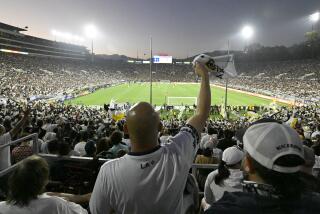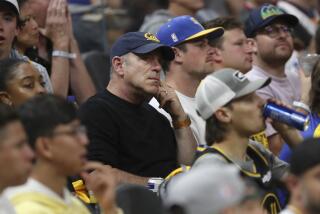Houston’s Problem: It Isn’t L.A.
- Share via
Houston has everything going for it to become the NFL’s 32nd franchise with the exception of one thing: NFL approval.
The NFL acknowledges that Houston, the fourth-largest city in the country, has an inviting stadium package, driven by $195 million in public money, and a respected and acceptable potential franchise owner in Robert McNair.
But Houston sits and waits patiently--with the expectation that the two Los Angeles-area proposals will not be able to meet NFL demands--leaving the league with no alternative but to choose Houston.
“The more we analyze the situations in Los Angeles and Houston, the costs of the operations and everything else, the more favorable this opportunity becomes,” said Steve Patterson, point man for McNair. “And most of the NFL owners we have been in contact with in recent weeks have indicated that expansion is easier to accomplish in Houston than Los Angeles.”
The league’s delay in awarding the 32nd franchise, however, has been a direct slap at Houston: It is not L.A., and all that L.A. has to offer in TV viewership.
“If the only decision-making criteria is the size of the market, then L.A. is certainly the larger market,” Patterson said. “But there are other things to consider. If you include soccer, L.A. has seven major league teams in that marketplace, while there are only two here. As a result, the percentage of major corporations that have to buy club seats and boxes becomes more diluted in L.A.
“There are the same number of Fortune 500 headquarters in each city, and we don’t have a new arena on the horizon before the end of 2003 or the beginning of 2004. L.A. will have a new arena, more boxes and seats to sell. There is more of a favorable environment to compete for those dollars in Houston.
“In addition, we have a significant public contribution to the football stadium, and we’re in a marketplace that is the second-fastest-growing area amongst the top 10 cities, next to Dallas. There’s also no AFC team anywhere in the region, and if you look at Florida, New York and California, they all have three football teams. California would be getting a fourth. Texas has one.”
Houston’s offer to the NFL includes support from the city, county and the Houston Livestock Show and Rodeo. Hotel and motel tax revenues would contribute $195 million in public money to the construction of an all-glass, $311-million stadium to be built next to the Astrodome.
McNair, a lifelong friend of Jerry Richardson, owner of the Carolina Panthers and chairman of the NFL’s stadium committee, has deep NFL ties extending to previous attempts to own NFL franchises in Miami, St. Louis, Baltimore and Minnesota.
“My goal is for Houston to have an NFL team,” said McNair, who has received across-the-board political and private support in Houston in contrast to the competition being waged in Southern California between Ed Roski and Michael Ovitz. “We have a real deal in place and have met all NFL requirements.”
More than that, McNair, who recently sold three power plants owned by his company, Cogen Technologies, to raise more cash for his football venture, has given the NFL assurances that he can meet the anticipated high price for an expansion franchise. The three power plants sold for $1.1 billion.
“Inertia on the NFL’s part is the difficult factor for both Houston and L.A.,” Patterson said. “The key is, if a new team is going to operate in a new facility in time for the 2002 season in either L.A. or Houston, a decision is needed in the first quarter of ’99.”
More to Read
Go beyond the scoreboard
Get the latest on L.A.'s teams in the daily Sports Report newsletter.
You may occasionally receive promotional content from the Los Angeles Times.










